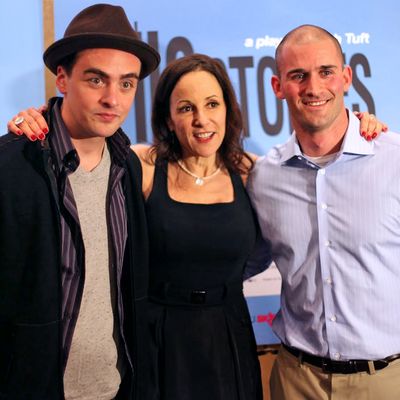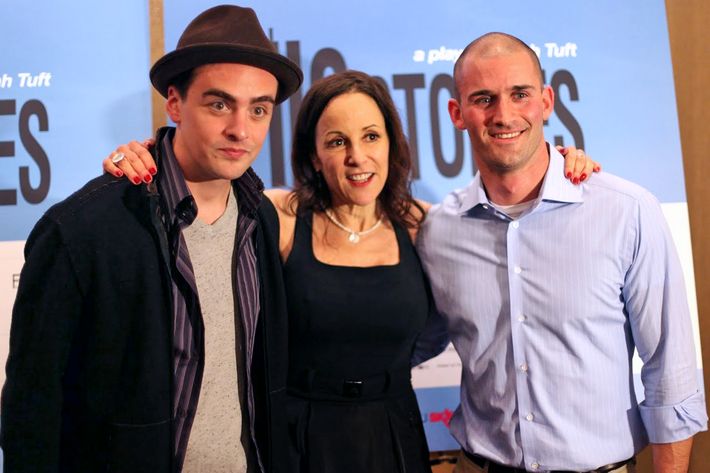

How are we remembering 9/11? I’ve been skulking around other folks’ rehearsals, trying to decide.
Lurking in the back of NYU’s Skirball Center yesterday (where the producers of the 9/11 compendium 110 Stories were kind enough to let me lurk), I watched a partial run-through of playwright Sarah Tuft’s anthology of collected testimonials, performed last night and tonight by a telethonic array of celebrities. (Among them: Cynthia Nixon, Tony Shalhoub, Jeremy Piven, Katie Holmes, Samuel L. Jackson, Kathleen Turner — the list goes on and on, like an Altman credits reel.) Director Gregory Mosher was running out of time, and by the end he had the cast skipping cue to cue. There was precious little time to work on interpretation, and precious little need: These are professionals, after all, and the accounts they’re reading — vivid, grim, displaying warts-and-all honesty — require very little “acting.”
The simple musical chairs of getting readers up to their lecterns and back to their seats was Mosher’s greatest challenge, and a bit of a logic puzzle, with 23 actors trading off eight mikes. Above their heads, a jumbo screen rolled a slow slideshow of images: the moonscape pallor of the dust-covered plaza, the tangles of steel looming out of the aerosolized concrete fog, that still-unreal image of the South Tower’s collapse, captured by a photographer standing directly beneath. We look at these images, and listen to famous people talking about body parts and cutting torches and makeshift funerals for plastic bags of loose human tissue. Stephen Baldwin talking about finding a severed limb: Isn’t this a strange fate for a downtown theater piece, originally performed by non-boldface-names in October of 2001? (Back then, it was part of Indivisible, a gallery of benefit performances curated by the outfit Gideon Productions.)
Cards on the table: I’ve got complex feelings about the whole practice of 9/11 memorializing and deep antipathy toward its close kin, 9/11 kitsch. Ground zero, for me, was permanently polluted by Bush’s “Bullhorn Moment,” and the natural and inevitable (but still disgusting and unforgivable) political hijack of this city’s sacred grieving process. But Tuft, while looking to avoid any hint of the political, tells me she has an aversion to that hugely abused term “heroes,” and she intentionally culled her monologues from ground-zero volunteers, firefighters, medical professionals, and office workers with more complicated, less “camera-ready” accounts of their experiences on the Day and, later, on the Pile. These are the people who readily admit to cowardice, frustration, creeping hysteria as, even back then, they began to realize how toxic the air was. (Many of the real-life storytellers are sick now, Tuft says.) It’s refreshing to hear one of the surviving firefighters, who barely escaped the North Tower, admitting that he didn’t want to go to the Pile, that he felt he’d done enough — he’d seen jumpers burst like water balloons, throwing themselves to their deaths; he’d had a building fall on him. He’d made it. And now he saw no good goddamned reason to go back. That’s not a story I’d heard; that’s not a bullhorn moment. “I made a promise,” Tuft says, “to use these stories for clarity.” This, I think, has been achieved — and with very little glare, despite all those luminaries.
110 Stories is at NYU’s Skirball Center for the Performing Arts tonight, September 9.




